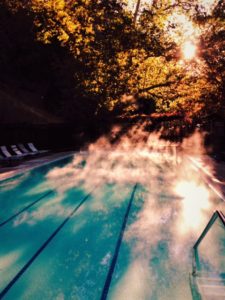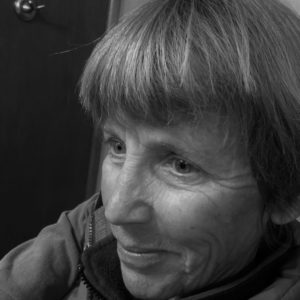On days just like this there’s a frozen quality to everything I do or say or write, as if the north wind brings with it the curse of contraction. I know others feel differently. Winter is a quiet time, internal, full of family and firelight, warm drinks, good books. They see the stars reflected in the snow. I see an icy plain that sparkles with the bonfires of demons.
I lived for a few years in the extreme winters of Iowa in a house that shuddered at every suggestion of wind. The front door often blew open in the middle of the night, sending a torrent of chilled air galloping through the rooms. Five days a week the postman came by and was happy to jumpstart my truck, but with snow two feet deep and unplowed roads it was impossible to go anywhere. Besides, I had to stay home and cover the chickens with blankets so they wouldn’t freeze in their sleep. Finally, as if to celebrate spring in the only way possible, the roof caught fire.
Human beings without seasons are a flat bunch—steady but curiously monochromatic. The color of winter for me is a creamy shade of gray that recently has the feel of endurance. I painted my room that color and in the summer it looked soothing, calming. Now it encloses me with a sense of hang on! When I lived in Iowa I painted the floors turquoise. I needed the feeling of walking through the Caribbean Sea. I needed water in that Midwestern land and with the ponds frozen and the streams iced over and the hardened snow covering the ground like a dull amnesia, I dug out my truck, replaced the battery, put a lightbulb under the hood every night to encourage ignition and got myself to the local swimming pool. It was there my swimming habit began and the fires of the demons sputtered out. All that was needed in the end was water.
My earliest pool was in New Jersey at my grandmother’s house. It was a slim thing, bright white with pale chlorinated water, a diving board at the deep end. It was the perfect length for swimming underwater without coming up for breath. The brilliant green New Jersey grass grew right to the edge of the pool. It was always soggy and made loud squishing sounds under our bare feet. Summer days were humid and hot. Sometimes we lay, without sunscreen, in the pool for hours on air mattresses, dangling our feet and hands in the water to cool off.
There was a string of pools after that, short love affairs, sometimes one-day stands, including the 60-degree pool in Key West, lined with hibiscus and jacaranda, where Ernest Hemingway regularly cleared his head after a long, tough night of drinking. There was an outdoor pool at an old abandoned convent somewhere on the California coast. My friend Tony and I discovered it and swam all night serenaded by the croaking frogs. And the public pool in Palm Springs, home of mid-century modern. Dozens of lap lanes, each with a sunburned man in it, and steam rising off the water, giving the impression of an open pot of lobsters. Impressions, impressions. Pools paint a picture of tranquility. The mouth stops moving and the ears and eyes relax. The transformative nature of water dispels the burden of linear thinking, of plodding existence, of dread, fear, flatness. We become otters and fish. I take my place in a lane next to a manatee, a dolphin.
The Iowa City outdoor pool opened for business in June. All through the stifling summers, in 95-degree heat, many of us graduate students, including some famous ones like John Irving and Flannery O’Connor, wallowed away the afternoons when our garrets became insufferably stuffy. It was pure joy to be released from winter for the few moments summer lasted. Even the open-air locker room was a source of wonder and sometimes ecstatic contemplation. Comfortably seedy, it was a symbol of time without borders, time on our hands. The walls weren’t walls at all, just partitions made of flimsy plywood painted sun-bleached white or light green, and the sinks were old and seldom worked, but the showers were intermittently hot and sometimes stayed on for longer than the count of three. The floor was rough concrete, scrapey underfoot and damp in places that didn’t slope down to drains. No roof. Above was open sky. I often felt I was in a Georgia O’Keeffe painting, inside the skull that hangs on the wall. When it rained there were puddles inside my shoes. Is a room a room if it rains inside? Sometimes a plane went over, dragging its contrail. Sometimes branches hung down into the shower or dressing rooms, giving a lively feeling to the place and a sense of nature despite the smell of wet concrete and chlorine. We walked around without our clothes on and the feeling was one of delicious risk, for who can walk naked in the middle of a city park except those enclosed by the cinderblock walls of the ladies’ locker room?
I dream of pools—mostly nightmares where I’ve arrived too late and the gates are shut or the water is only inches deep and I have to drag myself along on my arms. They’re dreams of being thwarted, of being unfree—a reminder from the demons. In my waking life I map cross-country routes from one swimming pool to the next: Bagdad, Arizona, where you can swim inside or out; Santa Fe where the lines of the ceiling are angled and lead you off-course if you’re doing the backstroke; a hot mineral pool the size of a football field in Durango and another in Pagosa Springs; the pools of Iowa that were my salvation; a YWCA pool in Cambridge, Massachusetts, that offers a No Swimsuit night. On days just like this when ice forms on the inside of the windows and wind beats a trail around the house, I let the wisdom of far more difficult winters lead me down the street to the pool. There the metronome of my stroking arms, the rumble of my kicking feet, the slap and gush of a flip turn in clear silvery water prove the antidote to demons.


